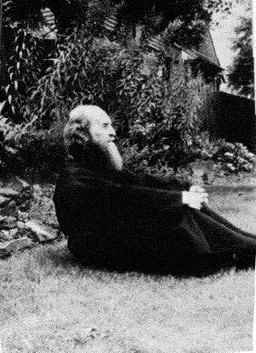|
The Risk in Creation
Archimandrite Sophrony Sakharov
|
 |
| Orthodox Outlet for Dogmatic Enquiries | Psychotherapy |
|---|
|
The Risk in Creation
Archimandrite Sophrony Sakharov
|
 |
|
To produce something new is always a gamble, and God’s creation of man in His image and after His likeness involved a certain degree of risk. It was not that He risked introducing an element of instability or shock into His Eternal Being but that to give man god-like freedom shut the door against predestination in any form. Man is at full liberty to determine himself negatively in relation to God- even to enter into conflict with Him. As infinite love, the Heavenly Father cannot abandon man whom He created for eternity, in order to impact to him His divine plenitude. He lives with us our human tragedy. We appreciate this risk, so breath-taking in its majesty, when we contemplate the life of Christ on earth. After long study of Michelangelo’s Last Judgment in the Sistine Chapel I discovered a partial analogy in the fresco with my conception of the Creation of the world. Look at Christ in the fresco, at the gesture He is making. Like some prize champion He hurls into the abyss all who have dared to oppose Him. The whole vast surface teems with people and angels trembling with fright. Suspended in some cosmic expanse, all are engrossed less with their own plight than with the wrath of Christ. He is in the centre and His anger is terrible. This, to be sure, is not how I see Christ. Michelangelo possessed great genius but not for liturgical subjects. Let us reconstruct the fresco. Christ, naturally, must be in the centre, but a different Christ more in keeping with the revelation that we have of Him: Christ immensely powerful with the power of unassuming love. He is not a vindictive gesture. In creating us as free beings, He anticipated the likelihood, perhaps the inevitability, of the tragedy of the fall of man. Summoning us from the darkness of non-being, His fateful gesture flings us into the secret realms of cosmic life. ‘In all places and fulfilling all things,’ He stays for ever close to us. He loves us in spite of our senseless behaviour. He calls to us, is always ready to respond to our cries for help and guide our fragile steps through all the obstacles that lie in our path. He respects us as on a par with Him. His ultimate idea for us is to see us in eternity verily His equals, His friends and brothers, the sons of the Father. He strives for this, He longs for it. This is our Christ, and as Man He sat on the right hand of the Father. In the beginning God creates our spirit as pure potential. What follows does not depend altogether on Him. Man is free to disagree, even to resist Him. A situation arises in which we ourselves determine our eternal future- always, of course, in relation to Him: without Him, we should not exist. And if we seek a hallowed eternity which essentially appertains to Him alone, then our every action, all our creative activity, must most certainly proceed not separately from Him but together with Him and in Him. Born as pure potential, our
spirit must go on to actualise our being as hypostasis. We need to
grow, and this growth is linked with pain and suffering. However
strange it may seem, suffering is imperative for the preservation of
life created from nothing. If animals did not feel hunger, they
would never make any effort to find food but would simply lie down
and die. Similarly, acute discomfort compels primitive man to look
for nourishment. Then, as he advances towards rational cognition,
suffering discloses to his contemplative mind both his own
imperfection and that of the world around him. This forces him to
recognise the necessity for a new form of creative effort to perfect
life in all its manifestations. Later, he will arrive at a certain
perception of Supreme Being which will inspire his soul to seek for
better knowledge of Him. And so on, until he realises that this
Primordial Being, Whom apprehension first caused him to esteem, does
not refuse congress with him; and in the light of this contact death
is seen as an absurdity, the very possibility of which must be found
against relentlessly. And history has shown that many of those who
waged this war with unflagging energy, even while they were still
here on earth in spirit beheld the eternal kingdom of the Living
God, and passed from death to unending life in the Light of Divine
Being. The foundation-stone of our
Christian theology is the revelation: ‘In the beginning was the
Word…and the Word was God…All things were made by him; and without
him was not any thing made that was made. In him was life’ (John
1.1, 3, 4). But contemporary science postulates that in the
beginning was hydrogen, and from this atom, by an evolutionary
process over milliards of years, everything else developed. The
scientific principle- the objectification of the cosmos together
with objective knowledge- is applicable only where the laws of
nature prevail absolutely. It is not clear on what basis many
scientists reject the possibility of other forms of being- of free,
non-determined being. We know that Primordial Being lies outside the
preserves of science, which can tell us nothing even of the meaning
of our existence.
|
Article published in English on: 6-10-2006.
Last update: 6-10-2006.